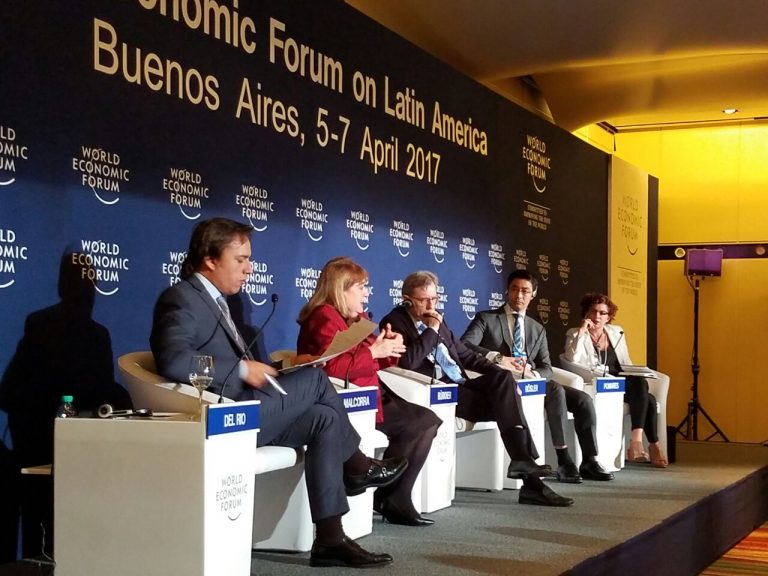During the WEF on Latin America, the public policy think tank promoted establishing a G20 agenda that could have a real impact without causing internal divisions in the countries.
Last Thursday, at a panel discussion at the World Economic Forum (WEF) on Latin America, CIPPEC’s Executive Director, Julia Pomares, encouraged setting a G20 agenda that could have a real impact without causing internal divisions in the countries.
With its upcoming G20 presidency, ‘Argentina has an enormous opportunity’ highlighted Pomares at the ‘Shaping the G20 Agenda’ session of the WEF on Latin America. She also pointed out that the greatest challenge regarding the group’s agenda is to reach a trade-off between achieving real impact and preventing further internal divisions in the countries. Furthermore, CIPPEC’s Executive Director emphasized that Latin America should ‘have a more coordinated agenda’ encompassing all of the region’s countries and not just Argentina, Mexico and Brazil, so that ‘the voice of the region could be heard louder’ at the G20.
CIPPEC’s Executive Director also said that for the G20 the 2030 Sustainable Development Goals (SDGs) agreed upon at the United Nations can serve as a ‘clear roadmap to resolve tensions created by populism’ and as ‘clear guiding principles to achieve inclusive development’.
In turn, Susana Malcorra, Minister of Foreign Affairs, highlighted that for Argentina the challenge of chairing the G20 and hosting the 2018 summit is enormous, not just for the effort required in terms of logistics, security and infrastructure, but also because the current international situation hinders the creation of a common agenda. Malcorra also supported the idea of uniting Latin America and adopting a constructive Southern perspective that could help understand the viewpoint of the developing countries.
Furthermore, Malcorra agreed with CIPPEC’s Executive Director on the need for a non-divisive G20 agenda and emphasized that therefore her main focus would be employment generation, a topic she believes will build bridges between the United States, China, the developing countries and the other nations of the group. Along those lines, the 2018 G20 agenda will also center on promoting systemic quality and continuing education with a focus on gender, that is to say, on girls’ education.
Both Pomares and Malcorra spoke at the ‘Shaping the G20 Agenda’ session of the World Economic Forum on Latin America, which took place in the afternoon of Thursday, 6th April. The other two panelists were Hans-Paul Bürkner, Chairman of Boston Consulting Group’s Board of Directors, and Philipp Rösler, Member of the Managing Board of the World Economic Forum and former Vice-Chancellor and Minister of Economics of the German Republic.
The G20, to be chaired by Argentina in 2018, is a platform for global economic cooperation. Against the backdrop of anti-globalization moves such as Brexit and the change of direction of the US foreign policy, the panel discussion revolved around how the G20 should change and adapt to ensure its continuing relevance.
CIPPEC is part of two so-called G20 engagement groups: the T20, made up by think tanks, and the W20, composed of gender-related organizations.
The World Economic Forum on Latin America is being hosted by Argentina for the first time in 13 years, with 1000 participants from 65 countries from every continent, and the main theme up for discussion is ‘Advancing towards the fourth industrial revolution for an inclusive Latin America’.

